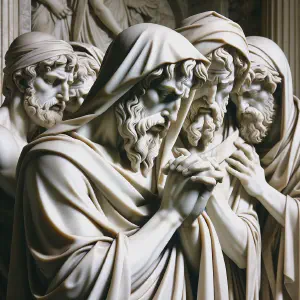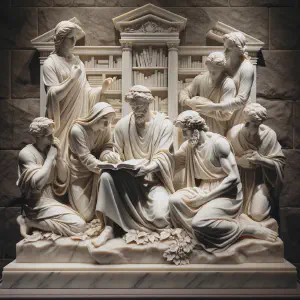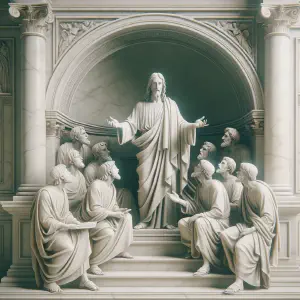The Rededication of the Temple
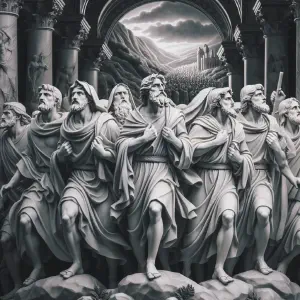
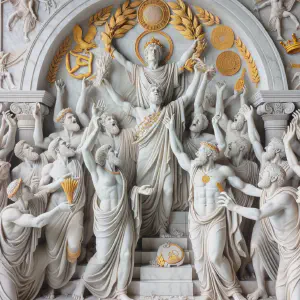
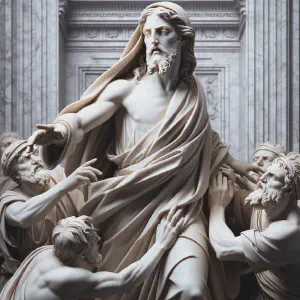
As the people of Israel celebrated the rededication of their temple, reflecting on their history and the blessings from God, they also witnessed a new kind of dedication in Jesus’ actions. His teachings and bold actions in the temple served as a testament to a deeper understanding of worship and devotion. The juxtaposition of the Maccabean dedication with Jesus’ cleansing of the temple underscores a continual theme of renewal and the constant call to return to genuine worship, a message that resonates across ages, reminding believers of the enduring power of faith and the sanctity of their places of worship.
Five Questions
What significance does the rededication of the temple in the Maccabees story hold for contemporary worshippers?
The rededication of the temple holds profound significance as it symbolizes the triumph of faith over adversity and the restoration of religious practices after a period of profanation. It’s a powerful reminder of the importance of preserving sacred traditions and spaces. For contemporary worshippers, it serves as an inspiration to maintain the sanctity of their own places of worship and to continually renew their commitment to their faith and community.
How do the actions of Jesus in the temple, as described in Luke, connect to the themes of purity and dedication found in the Maccabees story?
Jesus’ actions in the temple, driving out the merchants and declaring it a house of prayer, directly parallel the themes of purity and dedication in the Maccabees story. Both events emphasize the importance of maintaining the sanctity of worship spaces. While the Maccabees physically restored the temple, Jesus sought to spiritually cleanse it, highlighting the continuous need for both physical and spiritual renewal in places of worship.
In what ways do the celebratory practices following the temple’s rededication reflect the community’s relationship with God?
The celebratory practices, such as offering sacrifices and adorning the temple with gold crowns and shields, reflect the community’s deep gratitude and reverence towards God. These acts of joy and thanksgiving demonstrate their acknowledgment of God’s hand in their victory and restoration. It illustrates a reciprocal relationship where the community’s devotion and worship are met with divine guidance and blessing.
Can the passage from 1 Chronicles be seen as a reflection on or a response to the events in the Maccabees and Luke’s Gospel?
Yes, the passage from 1 Chronicles can be seen as a reflection on the themes presented in both the Maccabees and Luke’s Gospel. It emphasizes God’s sovereignty, majesty, and the granting of strength and riches, which resonate with the divine assistance experienced in the Maccabees’ victory and the authority Jesus demonstrated in cleansing the temple. This passage acts as a bridge, connecting the Old Testament’s focus on God’s grandeur with the New Testament’s emphasis on His active presence in human affairs.
What is the overall spiritual lesson that can be drawn from combining these scripture readings?
The overall spiritual lesson from these readings is the call for constant renewal and purity in our faith and worship practices. Whether it’s through the physical rededication of a sacred space or the spiritual cleansing exemplified by Jesus, these scriptures urge believers to continually reevaluate and deepen their relationship with God. They teach us the importance of maintaining reverence for sacred traditions and spaces, and remind us of the power of communal worship and individual dedication in our spiritual journey.
Bible Study
1 Maccabees 4:36-37, 52-59
Judas and his brothers said,
“Now that our enemies have been crushed,
let us go up to purify the sanctuary and rededicate it.”
So the whole army assembled, and went up to Mount Zion.Early in the morning on the twenty-fifth day of the ninth month,
that is, the month of Chislev,
in the year one hundred and forty-eight,
they arose and offered sacrifice according to the law
on the new altar of burnt offerings that they had made.
On the anniversary of the day on which the Gentiles had defiled it,
on that very day it was reconsecrated
with songs, harps, flutes, and cymbals.
All the people prostrated themselves and adored and praised Heaven,
who had given them success.For eight days they celebrated the dedication of the altar
and joyfully offered burnt offerings and sacrifices
of deliverance and praise.
They ornamented the facade of the temple with gold crowns and shields;
they repaired the gates and the priests’ chambers
and furnished them with doors.
There was great joy among the people
now that the disgrace of the Gentiles was removed.
Then Judas and his brothers and the entire congregation of Israel
decreed that the days of the dedication of the altar
should be observed with joy and gladness
on the anniversary every year for eight days,
from the twenty-fifth day of the month Chislev.
This passage describes Judas Maccabeus and his brothers leading the rededication of the temple in Jerusalem following its desecration. Judas, a key figure in the Maccabean revolt, fought against Hellenistic influence and sought to restore Jewish worship. This event, aligning with Catholic values of reverence for sacred spaces and the importance of ritual purity, also prefigures the Christian understanding of spiritual renewal and purification. It underscores the significance of community in worship and the collective responsibility to uphold religious traditions, resonant with the Catholic emphasis on communal prayer and the sanctity of religious ceremonies.
1 Chronicles 29:10-13
R. (13b) We praise your glorious name, O mighty God.
“Blessed may you be, O LORD,
God of Israel our father,
from eternity to eternity.”
R. We praise your glorious name, O mighty God.
“Yours, O LORD, are grandeur and power,
majesty, splendor, and glory.
For all in heaven and on earth is yours.”
R. We praise your glorious name, O mighty God.
“Yours, O LORD, is the sovereignty;
you are exalted as head over all.
Riches and honor are from you.”
R. We praise your glorious name, O mighty God.
“You have dominion over all,
In your hand are power and might;
it is yours to give grandeur and strength to all.”
R. We praise your glorious name, O mighty God.
In this passage, David’s prayer acknowledges God’s sovereignty and majesty, emphasizing themes of divine power and benevolence. David, the second king of Israel, known for his deep faith despite personal failings, embodies a figure of humility and recognition of God’s supremacy. This aligns with Catholic teachings on God’s ultimate authority and the virtue of humility, as outlined in the catechism. The passage also reflects Catholic values of praising God’s glory and acknowledging His role as the source of all blessings, resonating with the foundational belief in God’s providential care.
Luke 19:45-48
Jesus entered the temple area and proceeded to drive out
those who were selling things, saying to them,
“It is written, My house shall be a house of prayer,
but you have made it a den of thieves.”
And every day he was teaching in the temple area.
The chief priests, the scribes, and the leaders of the people, meanwhile,
were seeking to put him to death,
but they could find no way to accomplish their purpose
because all the people were hanging on his words.
This passage depicts Jesus cleansing the temple in Jerusalem, driving out those who commercialized its sacred space. Jesus, central to Christian faith as the Son of God and savior, demonstrates righteous indignation against practices that defile the sanctity of worship. This act aligns with Catholic teachings on the reverence due to sacred spaces and the need for purity in worship, as highlighted in the catechism and the Ten Commandments. It also reflects the Catholic understanding of Jesus’ role in reforming and renewing religious practice, emphasizing the importance of sincerity and integrity in worship and faith.
Lessons
These passages teach us the importance of faithfulness, reverence, and the continuous renewal of our spiritual commitments. The rededication of the temple by Judas Maccabeus and his brothers exemplifies a deep reverence for sacred traditions and the need for physical and spiritual purification. The joyous celebration of this rededication underscores the value of communal worship and gratitude towards God. Jesus’ cleansing of the temple in the Gospel of Luke reminds us of the need to maintain the purity of our places of worship, emphasizing that true worship stems from a heart devoted to God. These readings collectively call us to reflect on our own dedication to God, urging us to seek purity in our worship and to cherish our faith as a sacred gift, always open to renewal and transformation.
Meditation Prayer
